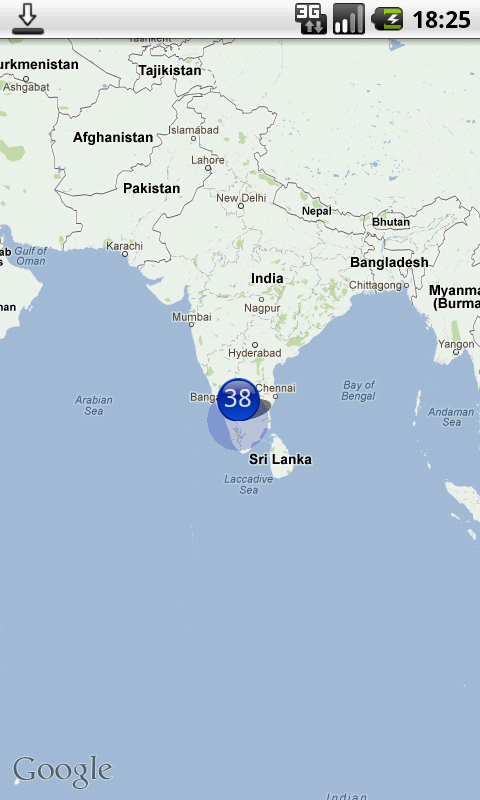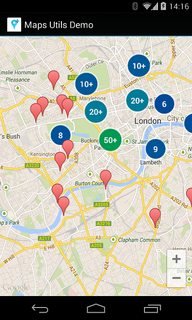Точки кластеризации Android Maps
Есть ли код для Point Clustering в Android? Как я могу загрузить тысячи точно, не имея проблем с производительностью?
7 ответов
Прошлой ночью я попал в PointClustering на Android MapView. Видел, что для сообщества ничего не вышло, поэтому я хотел бы поделиться.
Группирует географические точки, если их проекция в mapView слишком близка. Также отображает только видимые точки.
ОБНОВИТЬ
Код переработан с нуля.
Теперь доступно на GitHub
- Код переработан с нуля
- Использовал алгоритм кластеризации GVM (довольно быстрый, но не позиционирует кластерную точку так хорошо, как моя)
- Скоро добавим и предыдущий алгоритм кластеризации

Я переработал приведенный выше код и проконтролировал значок no overlay в виде карты и разделил группу и одну точку.
Мой код:
MMapView.java
import java.util.ArrayList;
import java.util.List;
import android.content.Context;
import android.graphics.BitmapFactory;
import android.graphics.Canvas;
import android.graphics.drawable.BitmapDrawable;
import android.graphics.drawable.Drawable;
import android.util.AttributeSet;
import com.google.android.maps.GeoPoint;
import com.google.android.maps.MapView;
import com.google.android.maps.Overlay;
import com.impiger.maphighlight.R;
//Reference - http://stackru.com/questions/7447350/android-maps-point-clustering
public class MMapView extends MapView {
private static final String TAG = MMapView.class.getSimpleName();
private static final int MAX_VISIBLE_POINTS = 1;
private PMapViewOverlay itemizedOverlay;
private List<Overlay> mapOverlays;
private List<GeoPoint> geoPoints = new ArrayList<GeoPoint>();
private BitmapDrawable drawable;
private Context context;
private Drawable emptyDrawable;
private int count;
private int oldZoomLevel = -1;
ArrayList<OverlayItemExtended> mOverlays;
public MMapView(Context context, AttributeSet attrs) {
super(context, attrs);
this.context = context;
mapOverlays = getOverlays();
drawable = new BitmapDrawable(
BitmapFactory.decodeResource(getResources(),
R.drawable.blue_65));
itemizedOverlay = new PMapViewOverlay(drawable, context);
emptyDrawable = context.getResources().getDrawable(
R.drawable.marker);
mOverlays = new ArrayList<OverlayItemExtended>();
init();
}
private GeoPoint getPoint(double lat, double lon) {
return (new GeoPoint((int) (lat * 1000000.0), (int) (lon * 1000000.0)));
}
private void init(){
putPoint(11, 77, true);
putPoint(11.5, 76.6, false);
putPoint(10.98383, 77.32112, false);
putPoint(10, 77, false);
putPoint(11, 78, false);
putPoint(11, 77.5, false);
putPoint(10.5, 77, false);
putPoint(12, 77, false);
putPoint(11.77, 77.11, false);
putPoint(12.1, 78.33, false);
putPoint(11.83, 77.293, false);
putPoint(11.12, 77, false);
putPoint(11.13, 77, false);
putPoint(11.14, 77, false);
putPoint(11.15, 77, false);
putPoint(11.12, 77.2, false);
putPoint(11.13, 77.34, false);
putPoint(11.14, 77.4, false);
putPoint(11.15, 77.1977, false);
putPoint(11.347373, 77.5627783, true);
putPoint(11.53454, 76.696645, false);
putPoint(10.19282, 77.847373, false);
putPoint(10.4728, 76.39388, false);
putPoint(11.4563, 78, false);
putPoint(11.73663, 77.5927, false);
putPoint(10.5674, 77.6762, false);
putPoint(12.02882, 77.672782, false);
putPoint(11.7767876, 77.1123423, false);
putPoint(12.18332, 78.33, false);
putPoint(11.8393883, 77.293938783, false);
putPoint(11.388323, 77.9478723, false);
putPoint(11.1345645, 77.97723, false);
putPoint(11.1423423, 77.73774, false);
putPoint(11.1552, 77.793783, false);
putPoint(11.127895434, 77.2944554, false);
putPoint(11.13232345, 77.342234, false);
putPoint(11.14456573, 77.4, false);
putPoint(11.159765, 77.1977, false);
}
public void putPoint(double lat, double lon, boolean isMyPosition) {
int latitude = (int) (lat * 1E6);
int longitude = (int) (lon * 1E6);
GeoPoint geo = new GeoPoint(latitude, longitude);
geo = getPoint(lat, lon);
/*
* Remove doubles
*/
Boolean alreadyExists = false;
for (GeoPoint item : geoPoints) {
if (item.getLatitudeE6() == geo.getLatitudeE6()
&& item.getLongitudeE6() == geo.getLongitudeE6()) {
alreadyExists = true;
}
}
if (!alreadyExists) {
geoPoints.add(geo);
}
}
/*
* Place the overlays
*/
public void placeOverlays() {
itemizedOverlay.removeAllOverlays();
getOverlays().clear();
mapOverlays.clear();
mOverlays.clear();
int i = 1;
for (GeoPoint item : geoPoints) {
OverlayItemExtended overlayitem = new OverlayItemExtended(item,
"title "+i, "snippet");
// Here is where the magic happens
addOverlayItemClustered(overlayitem, this,
geoPoints.size());
i++;
}
for(int j=0;j<mOverlays.size();j++){
OverlayItemExtended overlayItem = mOverlays.get(j);
if(overlayItem.isMaster){
if(overlayItem.slaves.size() > 0){
itemizedOverlay = new PMapViewOverlay(drawable, context);
itemizedOverlay.addOverlayItem(overlayItem);
}else{
itemizedOverlay = new PMapViewOverlay(emptyDrawable, context);
itemizedOverlay.addOverlayItem(overlayItem);
}
mapOverlays.add(itemizedOverlay);
}
}
}
/*
* Update the points at panned / zoom etc
*/
public void dispatchDraw(Canvas canvas) {
super.dispatchDraw(canvas);
if (getZoomLevel() != oldZoomLevel) {
placeOverlays();
}
oldZoomLevel = getZoomLevel();
}
public void addOverlayItemClustered(OverlayItemExtended thisOverlay,
MapView mapView, int totalPoints) {
for (OverlayItemExtended otherOverlay : mOverlays) {
/*
* Thresshold for the clustering
*/
/*
* Zoom level >15 don't cluster If less than Max_Visible_points
* don't cluster
*/
if (mapView.getZoomLevel() >= 14
|| (MAX_VISIBLE_POINTS > totalPoints)
&& PointCluster.getOverLayItemDistance(thisOverlay,
otherOverlay, mapView) > 60) {
mOverlays.add(thisOverlay);
return;
}
if (PointCluster.getOverLayItemDistance(thisOverlay, otherOverlay,
mapView) < 90 && !thisOverlay.isClustered) {
// Here is where the clustering actually happens
if (otherOverlay.isMaster) {
thisOverlay.isMaster = false;
// otherOverlay.isMaster = false;
thisOverlay.isClustered = true;
otherOverlay.isClustered = true;
otherOverlay.slaves.push(thisOverlay);
thisOverlay.parent = otherOverlay;
} else if (PointCluster.getOverLayItemDistance(thisOverlay,
otherOverlay.parent, mapView) < 90
&& otherOverlay.isClustered) {
thisOverlay.isMaster = false;
thisOverlay.isClustered = true;
thisOverlay.parent = otherOverlay.parent;
otherOverlay.parent.slaves.push(thisOverlay);
}
}
}
mOverlays.add(thisOverlay);
}
}
OverlayItemExtended.java
import java.util.Stack;
import com.google.android.maps.GeoPoint;
import com.google.android.maps.OverlayItem;
public class OverlayItemExtended extends OverlayItem {
public boolean isClustered = false;
public boolean isMaster = true;
public boolean isMe = false;
public OverlayItemExtended parent;
public Stack<OverlayItemExtended> slaves = new Stack<OverlayItemExtended>();
public OverlayItemExtended(GeoPoint point, String title, String snippet) {
super(point, title, snippet);
}
}
PMapViewOverlay.java
import java.util.ArrayList;
import android.content.Context;
import android.graphics.Canvas;
import android.graphics.Color;
import android.graphics.Paint;
import android.graphics.Point;
import android.graphics.drawable.Drawable;
import android.widget.Toast;
import com.google.android.maps.GeoPoint;
import com.google.android.maps.ItemizedOverlay;
import com.google.android.maps.MapView;
@SuppressWarnings("rawtypes")
public class PMapViewOverlay extends ItemizedOverlay {
private static final String TAG = PMapViewOverlay.class.getSimpleName();
private Context context;
private ArrayList<OverlayItemExtended> mOverlays;
public PMapViewOverlay(Drawable defaultMarker, Context context) {
super(boundCenterBottom(defaultMarker));
this.context = context;
mOverlays = new ArrayList<OverlayItemExtended>();
paint.setTextAlign(Paint.Align.CENTER);
paint.setTextSize(25);
paint.setAntiAlias(true);
paint.setStrokeWidth(5);
paint.setColor(Color.WHITE);
}
@Override
protected OverlayItemExtended createItem(int i) {
return mOverlays.get(i);
}
@Override
public int size() {
return mOverlays.size();
}
public void addOverlayItem(OverlayItemExtended overlay) {
mOverlays.add(overlay);
populate();
}
public void removeAllOverlays() {
mOverlays.clear();
populate();
}
public void removePointsButMe() {
for (int i = 0; i < mOverlays.size(); i++) {
OverlayItemExtended overlay = mOverlays.get(i);
if (overlay.isMe) {
mOverlays.clear();
addOverlayItem(overlay);
break;
}
}
populate();
}
Paint paint = new Paint();
@Override
public void draw(Canvas canvas, MapView mapView, boolean shadow) {
super.draw(canvas, mapView, shadow);
// cycle through all overlays
for (int index = 0; index < mOverlays.size(); index++) {
OverlayItemExtended item = mOverlays.get(index);
// Converts lat/lng-Point to coordinates on the screen
GeoPoint point = item.getPoint();
Point ptScreenCoord = new Point();
mapView.getProjection().toPixels(point, ptScreenCoord);
if (item.isMaster) {
if (item.slaves.size() > 0) {
canvas.drawText(item.slaves.size() + 1 + "",
ptScreenCoord.x, ptScreenCoord.y - 13, paint);
}
}
}
}
@Override
protected boolean onTap(int index) {
OverlayItemExtended item = mOverlays.get(index);
if (item.isMaster) {
if (item.slaves.size() == 0) {
Toast.makeText(context, "You tapped item " + item.getTitle(),
Toast.LENGTH_LONG).show();
}
}
return super.onTap(index);
}
}
Я не изменил код в PointCluster.java.
Надеюсь, это кому-нибудь поможет.
У Google Map Utils для Android есть решение для этого: Утилита Google Maps Android Marker Clustering.
Добавить зависимость
implementation 'com.google.maps.android:android-maps-utils:0.5'
Создайте свой собственный ClusterItem
class MyItem(
private val position: LatLng,
val title: String,
private val snippet: String
) : ClusterItem {
override fun getPosition() = position
override fun getTitle() = title
override fun getSnippet() = snippet
}
Настройка менеджера кластера и добавление элементов
override fun onMapReady(googleMap: GoogleMap) {
val clusterManager = ClusterManager<MyItem>(this, googleMap)
googleMap.setOnCameraIdleListener(clusterManager)
clusterManager.addItem(MyItem(LatLng(51.51, -0.12), "title", "snippet"))
}
Это оно! Элементы теперь отображаются следующим образом:
Настройка значка
Чтобы настроить иконку, добавьте val icon: BitmapDescriptor в свой ClusterItem и измените средство визуализации менеджера кластера:
clusterManager.renderer = object : DefaultClusterRenderer<MyItem>(this, googleMap, clusterManager) {
override fun onBeforeClusterItemRendered(item: MyItem, markerOptions: MarkerOptions) {
markerOptions.icon(item.icon)
}
}
Делаем предметы кликабельными
Как правило, любое взаимодействие с маркерами должно проходить через менеджер кластеров. То же самое относится и к тому, чтобы сделать элементы интерактивными
googleMap.setOnMarkerClickListener(clusterManager)
clusterManager.setOnClusterItemClickListener {
Toast.makeText(this, "Clicked on item ${it.title}", Toast.LENGTH_SHORT).show()
true
}
Точно так же вы можете позвонить googleMap.setOnInfoWindowClickListener(clusterManager) а также clusterManager.setOnClusterItemInfoWindowClickListener обрабатывать клики в информационном окне.
Для библиотеки Polaris (https://github.com/cyrilmottier/Polaris) есть запрос на получение github, который добавляет кластеризацию:
Для этого есть хороший образец. Проверьте это здесь: http://code.google.com/p/android-playground-erdao/source/browse/trunk/SampleClusterMap/?r=226
Там также этот ответ, который требует только переопределить метод рисования вашего оверлея. Он делит ваш mapView на разделы, поэтому он немного менее сложен. Но, по крайней мере, это сработало.
ДЛЯ ANDROID V2 ЗДЕСЬ ИДЕТ КЛАСТЕРНЫЙ КОД
Всем привет
Я посмотрел на различные библиотеки и нашел их настолько сложными, что не мог понять слово, поэтому я решил создать свой собственный алгоритм кластеризации. Вот мой код в Java
static int OFFSET = 268435456;
static double RADIUS = 85445659.4471;
static double pi = 3.1444;
public static double lonToX(double lon) {
return Math.round(OFFSET + RADIUS * lon * pi / 180);
}
public static double latToY(double lat) {
return Math.round(OFFSET
- RADIUS
* Math.log((1 + Math.sin(lat * pi / 180))
/ (1 - Math.sin(lat * pi / 180))) / 2);
}
public static int pixelDistance(double lat1, double lon1, double lat2,
double lon2, int zoom) {
double x1 = lonToX(lon1);
double y1 = latToY(lat1);
double x2 = lonToX(lon2);
double y2 = latToY(lat2);
return (int) (Math
.sqrt(Math.pow((x1 - x2), 2) + Math.pow((y1 - y2), 2))) >> (21 - zoom);
}
static ArrayList<Cluster> cluster(ArrayList<Marker> markers, int zoom) {
ArrayList<Cluster> clusterList = new ArrayList<Cluster>();
ArrayList<Marker> originalListCopy = new ArrayList<Marker>();
for (Marker marker : markers) {
originalListCopy.add(marker);
}
/* Loop until all markers have been compared. */
for (int i = 0; i < originalListCopy.size();) {
/* Compare against all markers which are left. */
ArrayList<Marker> markerList = new ArrayList<Marker>();
for (int j = i + 1; j < markers.size();) {
int pixelDistance = pixelDistance(markers.get(i).getLatitude(),
markers.get(i).getLongitude(), markers.get(j)
.getLatitude(), markers.get(j).getLongitude(),
zoom);
if (pixelDistance < 40) {
markerList.add(markers.get(i));
markerList.add(markers.get(j));
markers.remove(j);
originalListCopy.remove(j);
j = i + 1;
} else {
j++;
}
}
if (markerList.size() > 0) {
Cluster cluster = new Cluster(clusterList.size(), markerList,
markerList.size() + 1, originalListCopy.get(i)
.getLatitude(), originalListCopy.get(i)
.getLongitude());
clusterList.add(cluster);
originalListCopy.remove(i);
markers.remove(i);
i = 0;
} else {
i++;
}
/* If a marker has been added to cluster, add also the one */
/* we were comparing to and remove the original from array. */
}
return clusterList;
}
Просто передайте ваш список массивов, содержащий широту и долготу, чтобы отобразить кластеры.
@Override
public void onTaskCompleted(ArrayList<FlatDetails> flatDetailsList) {
LatLngBounds.Builder builder = new LatLngBounds.Builder();
originalListCopy = new ArrayList<FlatDetails>();
ArrayList<Marker> markersList = new ArrayList<Marker>();
for (FlatDetails detailList : flatDetailsList) {
markersList.add(new Marker(detailList.getLatitude(), detailList
.getLongitude(), detailList.getApartmentTypeString()));
originalListCopy.add(detailList);
builder.include(new LatLng(detailList.getLatitude(), detailList
.getLongitude()));
}
LatLngBounds bounds = builder.build();
int padding = 0; // offset from edges of the map in pixels
CameraUpdate cu = CameraUpdateFactory.newLatLngBounds(bounds, padding);
googleMap.moveCamera(cu);
ArrayList<Cluster> clusterList = Utils.cluster(markersList,
(int) googleMap.getCameraPosition().zoom);
// Removes all markers, overlays, and polylines from the map.
googleMap.clear();
// Zoom in, animating the camera.
googleMap.animateCamera(CameraUpdateFactory.zoomTo(previousZoomLevel),
2000, null);
CircleOptions circleOptions = new CircleOptions().center(point) //
// setcenter
.radius(3000) // set radius in meters
.fillColor(Color.TRANSPARENT) // default
.strokeColor(Color.BLUE).strokeWidth(5);
googleMap.addCircle(circleOptions);
for (Marker detail : markersList) {
if (detail.getBhkTypeString().equalsIgnoreCase("1 BHK")) {
googleMap.addMarker(new MarkerOptions()
.position(
new LatLng(detail.getLatitude(), detail
.getLongitude()))
.snippet(String.valueOf(""))
.title("Flat" + flatDetailsList.indexOf(detail))
.icon(BitmapDescriptorFactory
.fromResource(R.drawable.bhk1)));
} else if (detail.getBhkTypeString().equalsIgnoreCase("2 BHK")) {
googleMap.addMarker(new MarkerOptions()
.position(
new LatLng(detail.getLatitude(), detail
.getLongitude()))
.snippet(String.valueOf(""))
.title("Flat" + flatDetailsList.indexOf(detail))
.icon(BitmapDescriptorFactory
.fromResource(R.drawable.bhk_2)));
}
else if (detail.getBhkTypeString().equalsIgnoreCase("3 BHK")) {
googleMap.addMarker(new MarkerOptions()
.position(
new LatLng(detail.getLatitude(), detail
.getLongitude()))
.snippet(String.valueOf(""))
.title("Flat" + flatDetailsList.indexOf(detail))
.icon(BitmapDescriptorFactory
.fromResource(R.drawable.bhk_3)));
} else if (detail.getBhkTypeString().equalsIgnoreCase("2.5 BHK")) {
googleMap.addMarker(new MarkerOptions()
.position(
new LatLng(detail.getLatitude(), detail
.getLongitude()))
.snippet(String.valueOf(""))
.title("Flat" + flatDetailsList.indexOf(detail))
.icon(BitmapDescriptorFactory
.fromResource(R.drawable.bhk2)));
} else if (detail.getBhkTypeString().equalsIgnoreCase("4 BHK")) {
googleMap.addMarker(new MarkerOptions()
.position(
new LatLng(detail.getLatitude(), detail
.getLongitude()))
.snippet(String.valueOf(""))
.title("Flat" + flatDetailsList.indexOf(detail))
.icon(BitmapDescriptorFactory
.fromResource(R.drawable.bhk_4)));
} else if (detail.getBhkTypeString().equalsIgnoreCase("5 BHK")) {
googleMap.addMarker(new MarkerOptions()
.position(
new LatLng(detail.getLatitude(), detail
.getLongitude()))
.snippet(String.valueOf(""))
.title("Flat" + flatDetailsList.indexOf(detail))
.icon(BitmapDescriptorFactory
.fromResource(R.drawable.bhk5)));
} else if (detail.getBhkTypeString().equalsIgnoreCase("5+ BHK")) {
googleMap.addMarker(new MarkerOptions()
.position(
new LatLng(detail.getLatitude(), detail
.getLongitude()))
.snippet(String.valueOf(""))
.title("Flat" + flatDetailsList.indexOf(detail))
.icon(BitmapDescriptorFactory
.fromResource(R.drawable.bhk_5)));
}
else if (detail.getBhkTypeString().equalsIgnoreCase("2 BHK")) {
googleMap.addMarker(new MarkerOptions()
.position(
new LatLng(detail.getLatitude(), detail
.getLongitude()))
.snippet(String.valueOf(""))
.title("Flat" + flatDetailsList.indexOf(detail))
.icon(BitmapDescriptorFactory
.fromResource(R.drawable.bhk_2)));
}
}
for (Cluster cluster : clusterList) {
BitmapFactory.Options options = new BitmapFactory.Options();
options.inMutable = true;
options.inPurgeable = true;
Bitmap bitmap = BitmapFactory.decodeResource(getResources(),
R.drawable.cluster_marker, options);
Canvas canvas = new Canvas(bitmap);
Paint paint = new Paint();
paint.setColor(getResources().getColor(R.color.white));
paint.setTextSize(30);
canvas.drawText(String.valueOf(cluster.getMarkerList().size()), 10,
40, paint);
googleMap.addMarker(new MarkerOptions()
.position(
new LatLng(cluster.getClusterLatitude(), cluster
.getClusterLongitude()))
.snippet(String.valueOf(cluster.getMarkerList().size()))
.title("Cluster")
.icon(BitmapDescriptorFactory.fromBitmap(bitmap)));
}
}
ЛЮБЫЕ ВОПРОСЫ ИЛИ СОМНЕНИЯ ПОЖАЛУЙСТА, ПОЗВОЛЯЙТЕ УДАЛИТЬ ИХ ВСЕ........... СПАСИБО
